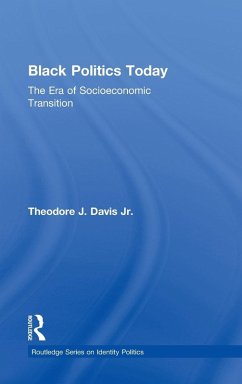The late 1980s ushered in a new era of black politics, the socioeconomic transition era. Coming on the heels of the protest era and politics era, the current stage is characterized by the emergence of a new black middle class that came of age after the Civil Rights struggle. Although class still isn't a strong factor in the external politics of the black community, it is increasingly a wedge issue in the community's internal politics. Black politics today is increasingly less about the interest of the larger group and more about the interest of smaller subgroups within the community. Theodore J. Davis Jr. argues that the greatest threat to the social and political cohesiveness of the so-called black community may be the rise of a socially and economically privileged group among the ranks of black America. This rift has affected blacks' ability to organize effectively and influence politics. Davis traces the changes in economic status, public opinion, political power and participation, and leadership over three generations of black politics. The result is an insightful analysis of black politics today.
Hinweis: Dieser Artikel kann nur an eine deutsche Lieferadresse ausgeliefert werden.
Hinweis: Dieser Artikel kann nur an eine deutsche Lieferadresse ausgeliefert werden.









